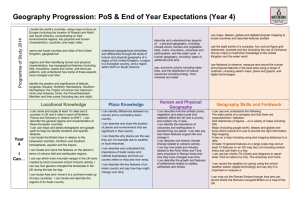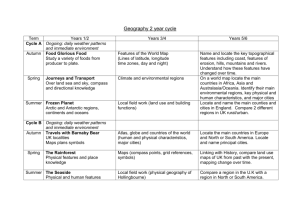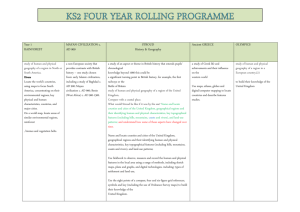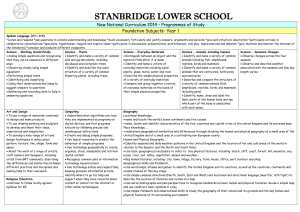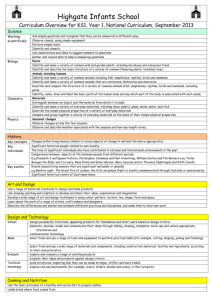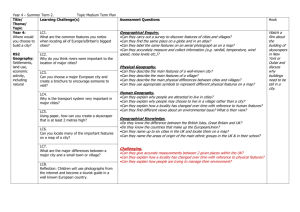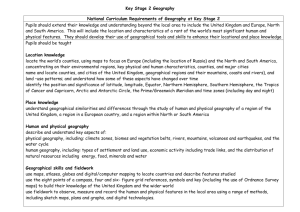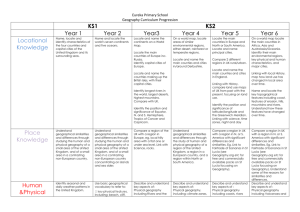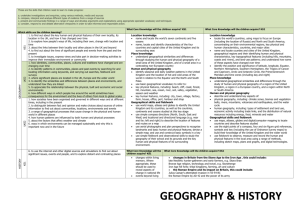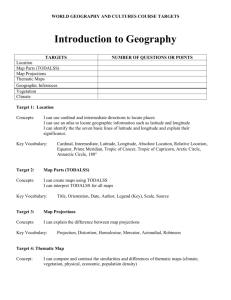Computing I can Grid Primary
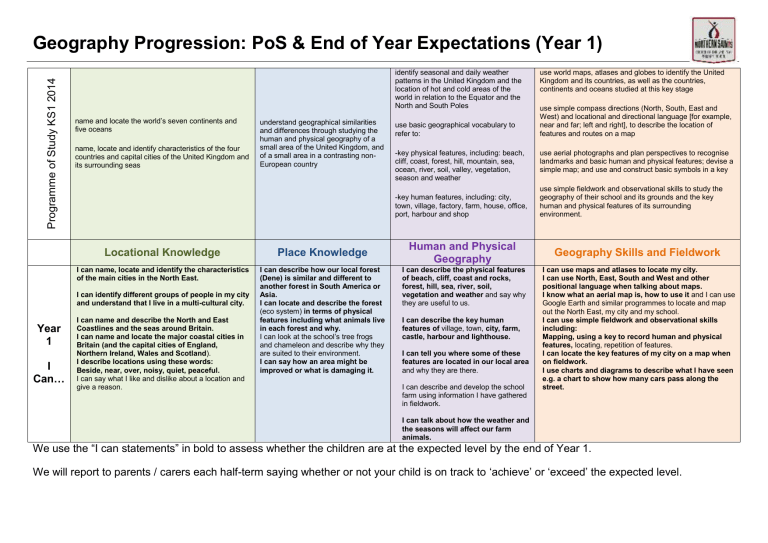
Geography Progression: PoS & End of Year Expectations (Year 1)
identify seasonal and daily weather patterns in the United Kingdom and the location of hot and cold areas of the world in relation to the Equator and the
North and South Poles use world maps, atlases and globes to identify the United
Kingdom and its countries, as well as the countries, continents and oceans studied at this key stage name and locate the world’s seven continents and five oceans name, locate and identify characteristics of the four countries and capital cities of the United Kingdom and its surrounding seas understand geographical similarities and differences through studying the human and physical geography of a small area of the United Kingdom, and of a small area in a contrasting non-
European country use basic geographical vocabulary to refer to:
-key physical features, including: beach, cliff, coast, forest, hill, mountain, sea, ocean, river, soil, valley, vegetation, season and weather use simple compass directions (North, South, East and
West) and locational and directional language [for example, near and far; left and right], to describe the location of features and routes on a map use aerial photographs and plan perspectives to recognise landmarks and basic human and physical features; devise a simple map; and use and construct basic symbols in a key
-key human features, including: city, town, village, factory, farm, house, office, port, harbour and shop use simple fieldwork and observational skills to study the geography of their school and its grounds and the key human and physical features of its surrounding environment.
Year
1
I
Can…
Locational Knowledge
I can name, locate and identify the characteristics of the main cities in the North East.
I can identify different groups of people in my city and understand that I live in a multi-cultural city.
I can name and describe the North and East
Coastlines and the seas around Britain.
I can name and locate the major coastal cities in
Britain (and the capital cities of England,
Northern Ireland, Wales and Scotland ).
I describe locations using these words:
Beside, near, over, noisy, quiet, peaceful.
I can say what I like and dislike about a location and give a reason.
Place Knowledge
I can describe how our local forest
(Dene) is similar and different to another forest in South America or
Asia.
I can locate and describe the forest
(eco system) in terms of physical features including what animals live in each forest and why.
I can look at the school’s tree frogs and chameleon and describe why they are suited to their environment.
I can say how an area might be improved or what is damaging it.
Human and Physical
Geography
I can describe the physical features of beach, cliff, coast and rocks, forest, hill, sea, river, soil, vegetation and weather and say why they are useful to us.
I can describe the key human features of village, town, city, farm, castle, harbour and lighthouse.
I can tell you where some of these features are located in our local area and why they are there.
I can describe and develop the school farm using information I have gathered in fieldwork.
I can talk about how the weather and the seasons will affect our farm
Geography Skills and Fieldwork
I can use maps and atlases to locate my city.
I can use North, East, South and West and other positional language when talking about maps.
I know what an aerial map is, how to use it and I can use
Google Earth and similar programmes to locate and map out the North East, my city and my school.
I can use simple fieldwork and observational skills including:
Mapping, using a key to record human and physical features, locating, repetition of features.
I can locate the key features of my city on a map when on fieldwork.
I use charts and diagrams to describe what I have seen e.g. a chart to show how many cars pass along the street.
animals.
We use the “I can statements” in bold to assess whether the children are at the expected level by the end of Year 1.
We will report to parents / carers each half-term saying whether or not your child is on track to ‘achieve’ or ‘exceed’ the expected level.
